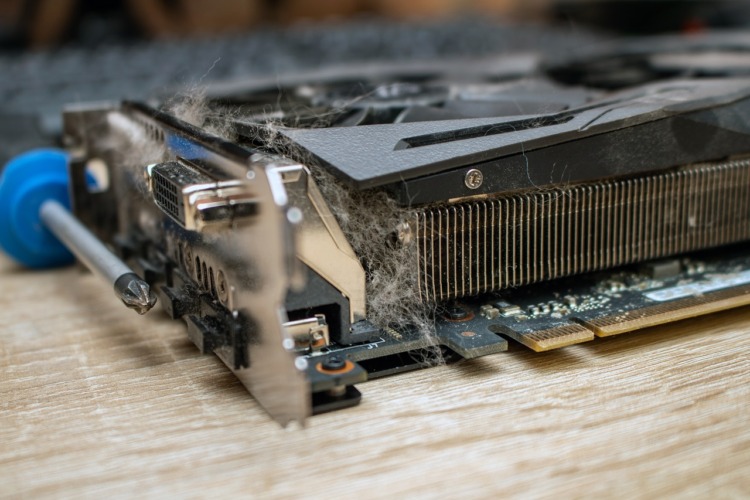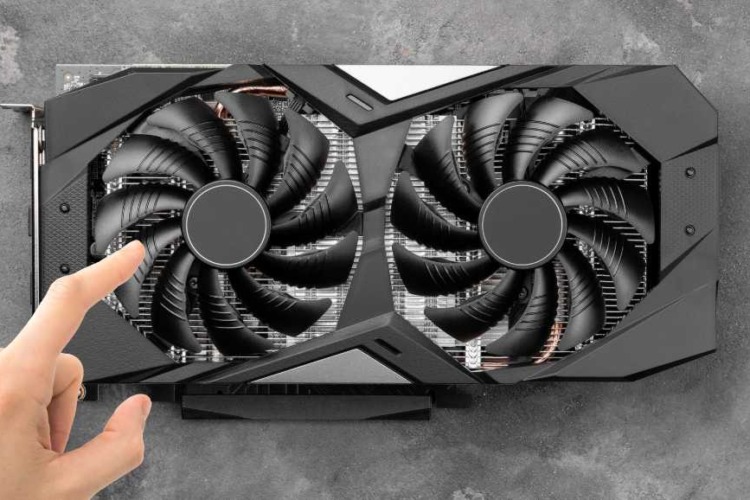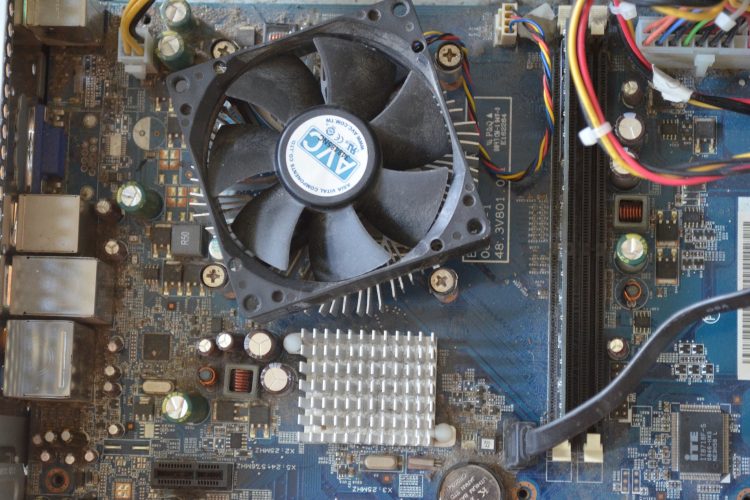Hey there, tech enthusiasts and PC gamers! Are you tired of that annoying GPU Fan Rattling Noise disrupting your immersive gaming or video editing sessions? You’re not alone. This common issue can be both distracting and concerning, but don’t worry—we’ve got you covered. In this comprehensive guide, we’ll walk you through the causes, diagnostic steps, and solutions to tackle this pesky problem. We’ll even share some prevention tips and recommend when it’s time to seek professional help. So, let’s dive in and get that GPU fan back to its whisper-quiet operation!
Why GPU Fans Are Important
The Heartbeat of Your Graphics Card
Let’s start with the basics. Your GPU (Graphics Processing Unit) is like the heart of your gaming or video editing rig. It’s responsible for rendering images, animations, and video. But just like any heart, it can get hot—very hot.
The Role of Cooling
So, what keeps this heart from overheating? The answer is simple: the GPU fan. This fan maintains lower temperatures, allowing your graphics card to run smoothly. Consequently, you get smoother gameplay and faster rendering.
The Consequences of Overheating
Now, let’s talk about what happens if things get too hot. Overheating can lead to performance issues. In extreme cases, it can even damage your GPU and other components.
The Science Behind It
Here’s how it works. The fan pulls in cool air and blows it over the hot GPU. This process transfers heat from the GPU to the heatsink. Finally, the hot air exits through the exhaust vents.
The Balance of Performance
Maintaining a consistent temperature is crucial. It prevents overheating and ensures optimal operation. On the flip side, keeping the fans always on can be noisy and may reduce their lifespan.
Beyond the GPU
But wait, there’s more. It’s not just the GPU that needs cooling. Your CPU, RAM, and even your power supply generate heat. Each of these components has its own cooling mechanism.
The Bottom Line
In summary, GPU fans are not just an accessory. They are a necessity for the health and performance of your system. So, the next time you hear that fan whirring, remember: it’s doing its job to keep your digital adventures smooth and trouble-free.
Common Causes of GPU Fan Rattling Noise
The Mystery of the Rattling Noise
So, you’ve noticed a rattling noise coming from your GPU fan. Annoying, right? But before you jump to conclusions, let’s explore what could be causing this unsettling sound.
Bearings: The Usual Suspects
First on the list are the bearings. These tiny components can be the root cause of that rattling noise, especially during startup. However, this alone doesn’t usually cause a problem. It’s not ideal, but it may go a long time like that.
Dust and Debris: The Silent Culprits

Next up, dust and debris. Over time, these particles can accumulate on the fan blades. This buildup reduces airflow and can result in more noise when the fan operates.
Off-Balance Fans: The Wobbly Offenders
An off-balance fan can also make your GPU sound like a rattling box of bolts. The uneven weight distribution on the fan blades can cause this. So, it’s worth checking if the fan wobbles when it spins.
Software Glitches: The Digital Gremlins
Believe it or not, software can also be a culprit. Some users have reported that certain software interferes with fan speed, causing irregular noises. Therefore, uninstalling unused or problematic software might help.
Loose Screws: The Overlooked Details
Loose screws on the fan’s mounting bracket can also contribute to the noise. Tightening them may solve the issue.
RPM and Noise: The Speed Factor
The speed of the fan matters too. Higher RPMs can make the fan noisier. So, if you’re playing a high-resolution game at 4K, expect some noise.
Temperature Fluctuations: The Hot and Cold
Temperature changes can also affect the fan. In colder environments, the lubricant inside the fan may thicken, causing noise. Conversely, hot conditions can make the fan work harder, leading to more noise.
The Duration: How Long Does It Last?
Interestingly, the duration of the noise can vary. Some users report that the noise lasts for exactly 2.1 seconds. Others say it’s more sporadic.
The Volume: How Loud Is It?
The noise level can also vary. Some find it barely noticeable, while others find it quite distracting. If you’re sitting close to the case, you’re more likely to hear it.
In conclusion, a rattling GPU fan can be caused by various factors. From physical components like bearings and screws to digital aspects like software, many things can contribute. Therefore, identifying the root cause is the first step in solving this noisy problem.
How Much Noise Should You Expect?
The Sound Spectrum
So, you’ve got your gaming rig set up, but how much noise should you actually expect from your GPU fan? Well, it’s not a one-size-fits-all answer. Different GPU models produce varying levels of noise.
The RPM Factor
Firstly, let’s talk about RPMs, or Revolutions Per Minute. The higher the RPMs, the noisier your fan will get. This is especially true when you’re running high-resolution games at 4K.
Model Matters
Interestingly, the noise level can differ significantly between models. For instance, a 1080TI from EVGA might be almost silent, even at high fan speeds. On the other hand, a 3080TI could sound like a jet engine taking off.
The Decibel Debate
Now, how do we measure this noise? Some experts use decibels (dB), while others prefer sone. Both have their pros and cons, but dB is generally more common.
The Acceptable Range
So, what’s acceptable? A noise level under 31 dB(A) is considered very good for idle conditions. However, anything above 50 dB(A) is usually unbearable and indicates a problem.
Sudden Changes
But what if the noise suddenly spikes? A sudden increase in noise could indicate a need for cleaning or some kind of fix
The Gaming Factor
Moreover, the type of games you play can affect the noise level. High-end games with detailed graphics will make your GPU work harder. Consequently, the fan will be noisier.
The Environment
Your room’s temperature can also play a role. Colder environments might cause the fan’s lubricant to thicken, leading to more noise. Conversely, hot conditions will make the fan work overtime.
In conclusion, the amount of noise you should expect from your GPU fan varies. It depends on several factors like the GPU model, the type of games you play, and even your room’s temperature. So, it’s essential to know what’s normal for your specific setup to identify any issues effectively.
Diagnostic Steps for GPU Fan Rattling Noise
So, you’ve heard that dreaded rattling noise from your GPU fan. Don’t panic! The first step is to identify the issue. Let’s walk through some diagnostic steps to get to the root of the problem.
Step 1: Power Down
Firstly, turn off your computer. It’s essential to ensure your safety and prevent any further damage.
Step 2: Open the Case
Next, open your computer case. You’ll need to access the GPU fan to diagnose the issue effectively.
Step 3: Visual Inspection
Now, take a good look at the fan. Check for any visible issues like dust buildup or loose screws. These are common culprits for rattling noises.
Step 4: Spin Test
Gently spin the fan with your finger. If it wobbles, the issue might be with the bearings or balance.

Step 5: Clean the Fan
If you notice dust or debris, clean the fan blades. A can of compressed air works wonders for this task.
Step 6: Tighten Screws
Loose screws can also cause rattling. So, grab a screwdriver and tighten any loose screws you find.
Step 7: Software Check
Believe it or not, software can interfere with fan operation. Check for any software that might be causing the fan to behave erratically.
Step 8: Temperature Monitoring
Use software like MSI Afterburner to monitor the GPU temperature. High temperatures can cause the fan to work harder, leading to more noise.
Step 9: RPM Monitoring
Also, monitor the fan’s RPM. If it’s unusually high, it could be the source of the noise.
Step 10: Sound Test
Finally, turn your computer back on. Listen carefully to the fan. If the noise persists, you may need professional help.
What’s Next?
So, you’ve gone through the steps but still hear the noise? It might be time to consider replacing the fan or the entire GPU if it’s under warranty.
Solutions and Fixes for GPU Fan Rattling Noise
So, you’ve diagnosed the issue, and now you’re wondering how to fix that annoying rattling noise. Don’t worry; we’ve got you covered. Let’s dive into the solutions and fixes you can try.
Solution 1: Cleaning the Fan
Firstly, let’s start with the basics. Dust and debris can be a significant cause of noise. Use a can of compressed air to clean the fan blades thoroughly. This simple step can sometimes solve the problem entirely.
Solution 2: Tightening Loose Screws
Next, grab a screwdriver and tighten any loose screws on the fan’s mounting bracket. Loose screws can contribute to the rattling noise, so make sure everything is snug.
Solution 3: Replacing the Bearings
If the bearings are the issue, consider replacing them. This step might sound complicated, but it’s doable with some basic tools. However, if you’re not comfortable doing this, seek professional help.
Solution 4: Software Fixes
Believe it or not, software can also be a culprit. Uninstall any software that might be interfering with the fan’s operation. This step can sometimes resolve the issue.
Solution 5: Vibration-Absorbing Material
Adding a vibration-absorbing material to your computer case can also help. This material can dampen the noise and make your setup quieter.
Solution 6: Fan Replacement
If the fan is damaged beyond repair, consider replacing it. Keep in mind that doing this yourself may void the warranty, so check that first.
Solution 7: Temperature and RPM Monitoring
Use software like MSI Afterburner to keep an eye on the temperature and RPM. If either is unusually high, it could be the source of the noise. Adjust the settings accordingly.
Solution 8: Professional Help
If you’ve tried everything and the noise persists, it might be time to seek professional help. Sometimes the issue can be more complex than it appears.
Solution 9: Warranty Claims
If your GPU is still under warranty, consider making a warranty claim. The manufacturer can either replace the fan or the entire GPU, solving the issue once and for all.
Solution 10: Community Help
Lastly, don’t underestimate the power of community forums. Sometimes other users have faced similar issues and can offer valuable advice.
In conclusion, a rattling GPU fan can be annoying, but it’s usually fixable. From cleaning and tightening screws to software fixes and professional help, there are plenty of solutions available. The key is to diagnose the issue correctly and then take the appropriate steps to fix it.
Prevention Tips for GPU Fan Rattling Noise
Hey there, tech enthusiasts! So, you’ve learned how to diagnose and fix a rattling GPU fan. But what about preventing the issue in the first place? Let’s dive into some practical tips to keep your GPU fan running smoothly.
Regular Cleaning
First and foremost, regular cleaning is a must. Dust and grime can accumulate on the fan blades, causing imbalance and noise. Use a can of compressed air to clean the fan blades every month.
Proper Placement
Next, consider the placement of your CPU. Make sure it’s on a flat surface and avoid putting objects on top of it. Proper placement ensures better airflow and less noise.
Software Management
Too many resource-intensive apps can strain your CPU and GPU. Close unnecessary apps when you’re gaming or doing other heavy tasks. This will reduce the workload on your fan.
Fan Speed Control
Managing fan speed is crucial. Software like MSI Afterburner allows you to control the fan speed. Keep it at a moderate level to avoid unnecessary noise.
Regular Checkups
Conduct regular checkups on your fan and its mounting bracket. Make sure all screws are tight and that there’s no visible damage. This simple step can prevent many issues down the line.
Vibration Dampening
Consider adding vibration-absorbing material to your computer case. This can significantly reduce the noise generated by your GPU fan.
Temperature Monitoring
Keep an eye on your GPU temperature. High temperatures can cause the fan to work harder, leading to more noise. Use monitoring software to keep track.
Community Advice
Don’t underestimate the power of community forums. Users often share valuable tips and tricks that can help you prevent fan noise.
Warranty and Manufacturer Guidelines
Always adhere to the manufacturer’s guidelines for maintenance. If your GPU is under warranty, make use of it for regular servicing.
Preventing GPU fan noise is easier than you might think. From regular cleaning to software management, these tips can go a long way in keeping your setup quiet and efficient. So, why wait? Start implementing these tips today and enjoy a noise-free gaming experience.
FAQs on GPU Fan Rattling Noise
Q: Why is my fan making a rattling sound?
A: A rattling sound from your fan could be due to several reasons. It could be dust accumulation, loose screws, or even worn-out bearings. Regular maintenance and cleaning can often resolve this issue.
Q: Why are my GPU fans making a weird noise?
A: Weird noises from GPU fans can be concerning. The noise could be due to dust buildup, software interference, or mechanical issues like worn-out bearings. It’s essential to diagnose the issue to find the right solution.
Q: How do I fix my fan rattling?
A: Fixing a rattling fan involves a few steps. First, power down your computer and open the case. Inspect the fan for dust or loose screws. Clean the fan blades and tighten any loose screws. If the issue persists, you may need to replace the bearings or seek professional help.
Q: How do I know if my GPU fan is failing?
A: Signs of a failing GPU fan include inconsistent RPMs, unusually high temperatures, and persistent noises. Software like MSI Afterburner can help you monitor fan performance and temperature. If you notice any of these signs, it’s best to take immediate action.
Q: Is fan rattling normal?
A: Fan rattling is not normal and often indicates an underlying issue. It could be as simple as dust buildup or as complex as a mechanical failure. Addressing the issue promptly can prevent further damage to your system.
Q: Is it normal for PC fans to rattle?
A: No, it’s not normal for PC fans to rattle. Rattling usually indicates a problem that needs attention. It could be due to dust, imbalance, or mechanical issues. Regular maintenance can help prevent such noises.
When Should You Bring Your Computer to a Repair Shop for GPU Fan Rattling Noise Fixing?
The Last Resort
So, you’ve tried all the DIY fixes, but that pesky rattling noise just won’t go away. It might be time to consider professional help. But how do you know when it’s the right time to head to a repair shop?
Persistent Noise
Firstly, if the noise persists despite your best efforts, it’s a sign. You’ve cleaned the fan, tightened the screws, and even replaced the bearings, but the noise is still there. This could indicate a more complex issue that requires professional expertise.
Software Failures
Next, if you’ve ruled out software issues but the problem persists, a repair shop can help. Sometimes, the issue might be with the motherboard or other hardware components that are beyond DIY fixes.
Temperature Spikes
High and inconsistent temperatures are another red flag. If your GPU is overheating despite a functioning fan, it could be a sign of a deeper issue. A professional can diagnose and fix the problem more effectively.
Warranty Limitations
If your GPU is still under warranty, you might want to consider professional help right away. DIY fixes can sometimes void the warranty, so it’s safer to get it checked by experts.
Lack of Tools or Expertise
Lastly, if you don’t have the necessary tools or expertise, don’t risk it. A botched DIY repair can cause more harm than good. In such cases, a repair shop is your best bet.
Recommended Repair Shop: Volta PC Upgrade & Repair in Singapore
If you’re in Singapore and looking for a reliable place to get your GPU fan issues sorted, we highly recommend Volta PC Upgrade & Repair. They have a stellar reputation for providing top-notch services for all kinds of computer repairs, including GPU fan rattling.
What sets them apart is their expertise and exceptional customer service.
Their team of professionals is well-versed in diagnosing and fixing GPU fan issues, ensuring that your system is back to its optimal performance in no time.
Located conveniently in the heart of Singapore, Volta PC Upgrade & Repair is easily accessible.
So, if you’ve tried all the DIY fixes and it’s time for professional help, make your way to Volta.
In summary, if you’re facing persistent GPU fan issues and are based in Singapore, Volta PC Upgrade & Repair is your go-to solution. With their expertise and excellent customer service, you can rest assured that your computer is in good hands.
Address:
- Tai Seng Branch: 8 Burn Road #01-04, Trivex, Singapore 369977
- Jurong Branch: Blk 132 #01-279C, Jurong Gateway Road, Singapore 600132

